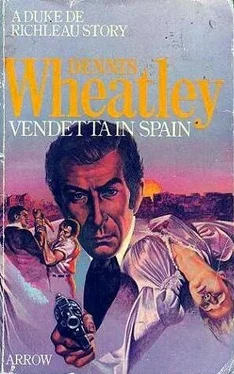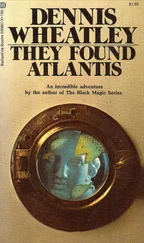The sweat was running down her face and she was breathing fast. 'San Cugat,' she panted. 'He now ... calls himself... Olozaga.'
The Duke nodded, then he said earnestly, 'Listen, Teresa. Your father was an anarchist. I expect he brought you up as an atheist and it is generally those who have always said that they do not believe in God who fear most to die. But you have nothing to fear. I promise you that. I'm afraid there is not the time to bring a priest to you; but if you simply say, "Please God, for Jesus Christ's sake, forgive me my sins," that will be enough.'
Her eyes brightened a little. She clutched at his free hand and slowly panted out the words after him. A few minutes later a spasm shook her, then her head rolled sideways and she was dead.
Lowering her head to the floor he put the towel over her face and stood up. According to his own beliefs no deathbed repentance could be of the slightest value. It was not logical that a person who had been mean, cruel and unscrupulous could, by muttering a few words, with or without the assistance of a priest, have the bill receipted for all the suffering they had caused in their lives. Teresa, like everyone else, would have to pay off such ill that she might have done to others, and her untimely, painful death would be only something on account. But, as he washed her blood from his hands at the kitchen sink, he knew that he had at least been right in telling her that she had nothing to fear, and he was glad that he had been able to give her in her last moments the conventional comfort without which a woman of her class might have died in terror.
He was far less happy about having used the fact that she was dying to extract from her Ferrer's whereabouts. But on that score he comforted himself with the thought that if there were not men like Ferrer no bomb would have come through the window to destroy her and her two little children.
As he finished washing, Veragua came in to report that the fire in the sitting-room was out. He was followed by a local policeman, notebook in hand, who had just arrived on the scene and was taking down particulars of the tragedy. De Richleau produced his police-card, made a statement, and said that he intended to take the surviving child away with him. He then collected the still weeping little Francisco, left the policeman in charge, and with Veragua walked along the street to their car.
On the way Veragua congratulated him in the heartiest manner on his narrow escape, and remarked that it had been good luck for him too, as he would have got into frightful trouble if de Richleau had been injured, since he would have failed in his duty as a bodyguard. They then speculated on how any anarchist could have been on hand to throw a bomb and so cut short the questioning of Teresa Irujo. As no one could have known of the Duke's intention to meet her, they decided that the only explanation must be that the enemy had learnt about 'Senor Goma's' investigation and had been stalking him all day, waiting for a suitable opportunity to throw the bomb, and that only chance had led to the attempt to murder him being made while he was in Teresa's cottage.
As they were driving down the hill Veragua asked if the Duke had managed to get anything out of Teresa during his long talk with her. To which he replied:
'One line that may be worth following. But this affair has been pretty shattering to the nerves, so I think we will take it easy for what remains of the afternoon. You can collect me again from the fortress at nine o'clock. That should give me just time to have a quick dinner.'
Since de Richleau was entirely lacking in nerves of that kind, he was prevaricating. But he had decided not to make his attempt to catch Ferrer until night had fallen and, in the meantime, he had no intention of letting even Veragua know the high hopes he now had for that evening.
When they arrived at Montjuich he carried little Francisco into the Captain-General's residence and gave him temporarily into the charge of one of the woman servants. Then he went upstairs and lay down on his bed.
At seven o'clock he came down to the drawing-room to find Mercedes there alone stitching away at her bedroom slippers. It then occurred to him that she would make a much more responsible protectress for his small thumb-sucker than would her socially-obsessed mother. So he told her Teresa's story and about the tragedy that had occurred that afternoon, and asked if she could find a suitable family among* the married N.C.O.s of the garrison in which the boy could be boarded and brought up; adding that he would make over to her a capital sum sufficient to provide a small income for the child's keep.
Mercedes listened with wide eyes, then willingly agreed to his request. Little Francisco was produced from the servants' quarters, his cheerfulness now restored from having been regaled with a surfeit of sugar plums, and Mercedes, delighted with her new charge, carried him off to make arrangements for him to be bathed and put to bed.
De Richleau then telephoned Urgoiti and asked how late he would be remaining at his office, adding that he hoped to bring in a very special prisoner round about eleven o'clock. The Coman-dante replied that he had plenty of work to occupy him, so he would return to his office after dinner and remain there till midnight.
When the General and his wife came in the Duke again gave the story of the attempt that had been made upon his life that afternoon, and praised their daughter for the willingness she had shown to take charge of the little orphan. He then asked to be excused from changing for dinner, as he had to go out again at nine o'clock, and for the loan of a key to the house as he might not get back until very late. Quiroga provided the key and his wife had dinner put forward by half an hour; so when Veragua arrived in the motor to collect de Richleau they were able to set off without delay.
The village of San Cugat de Valles lay about seven miles to the north of Barcelona behind the great mountain of Tibidabo. As they had to drive right through the city it was nearly half past nine when they reached it. De Richleau had contemplated a much later raid, with the idea of catching Ferrer in bed. But he had still to find out where the 'Senor Olozaga' lived, and to have made inquiries in the village at a late hour of the night might have resulted in Ferrer's being sent a warning that somebody was after him.
Having halted Veragua well before they came to the village square, the Duke left the car and continued on foot. There was only one cafe there, and it was somewhat dimly lit, with only a few people sitting at its tables. Seating himself at a vacant one, he ordered a Fundador with water. When the waiter brought it the Duke said casually that he had recently made a contact in San Cugat which would bring him out there on business fairly frequently, and he had been told that some old friends of his named Olozaga had moved into the neighbourhood. Perhaps the waiter could tell him whereabouts they lived, then next time he came out he would look them up.
The waiter replied that a couple of that name lived in a small villa out on the road to Sabadell. It was on the left and easy to recognize as it had a little turret; but they kept themselves very much to themselves and came into the village only to do their shopping.
De Richleau tipped the man, but not too lavishly, took plenty of time about finishing his brandy, then rejoined Veragua. They drove out along the Sabadell road until they sighted the villa with a turret, then backed the car up a side turning on to a patch of grass and left it.
Only then did the Duke tell his eager young companion that he had reason to believe that Ferrer was living in the villa. Walking forward, they reconnoitred it. There was no other building within five hundred yards. On either side of its porch it had a bay window. In that on the right a light showed through drawn curtains. The rest of the house was in darkness.
Читать дальше












